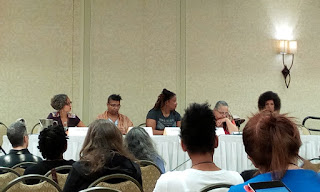One of my favorite panels at WisCon 40 was "YES, Our Stories Matter: Encouragement and Support for Creators with Marginalized Identities." It was held on Friday afternoon at 4, in a small room (University C), moderated by Jaymee Goh, featuring panelists Susan Simensky Bietila, Alex Jennings, Mark Oshiro, and Riley. More people attended than WisCon's programming mavens anticipated (I imagine that most of the time, estimating attendance for a particular panel is a crap-shoot), resulting in attendees standing against the back wall and sitting on the floor in the aisle.
The panel's topic was one that many of us have been thinking about for a long time now; certainly it's one that writers and other creators attending WisCon are likely to be grappling with or have in the past grappled with. What strikes me as new about the subject, though, is an accumulating understanding of and greater consciousness all around that people with marginalized identities are likely to meet with an additional set of obstacles when attempting to sell and otherwise disseminate their work. For most of my life I found it difficult to articulate this problem without finding myself thrust into a scripted defensiveness. Founding Aqueduct Press allowed me, for the first time, to escape that script. I'm more pleased than I can say that many, many people are now getting it. And I was delighted to find that the discussion afforded by this panel was both practical and sophisticated.
Here's the official description, taken from the Pocket Program Book:
Marginalization affects our success as creators, oppression impacts our ability to create and can grind us down. At the same time, encouragement can come in many ways, from reader comments to supporting each other as marginalized creators. Let's discuss issues like: Why do you keep creating? When do you know you've touched someone with your art? How do you recharge after a setback? How can we support each other within and between different marginalized groups? When it feels like the whole world is telling you that your story doesn't matter, where do you find the strength to pick up the pen?
The notes I took are, I'm sorry to say, sketchy, perhaps because so much of the discussion was rooted in very particular experiences I felt I couldn't abstract generalizations from lest the lack of context introduce distortion.
First: I found the composition of the panel a great advantage. Sue Bitelia drew on her experience of her long struggle to get around the barriers confronting her in the 1960s when she began her career as an artist, an experience that at many points resonated with the experiences of the three younger members of the panel--offering, I think, some hope, since Sue has, after decades, achieved gratifying recognition. Alex, Riley, and Mark, working in twenty-first century media as they are, face different circumstances but are, in the main, grappling with some of the same issues Sue had to take on to pursue a career in art.
The one generalization I can safely make is that for all of them, engaging in some degree of Do It Yourself has been essential. This makes great sense to me, of course, not only because of my having founded Aqueduct Press (a prime example of DIY, if I do say so myself), but also because when I was 19and still composing music I understood that organizing performances without official sanction was the best chance I had of getting my music performed and heard. (This only stopped working for me when I lost all confidence in myself as a composer; many of this blog's readers will be familiar with the story of how I lost confidence, which I described in my WisCon 32 GoH speech.)
Perhaps the most striking moments of the panel came when the panelists discussed networking. For decades now, "networking" has been offered up as the most important thing young creators (or even academics) can do. But as one panelist noted, networking with people who have said horribly racist things on panels is horrifying. Conventions--including science fiction conventions-- often (usually?) serve up boundaries and obstacles creators with marginalized identities can't escape. "The whole weekend at most conventions are a nightmare for me of one bad experience after another," one panelist said.
I should also point out that Sue, Alex, Mark, and Riley all noted the importance to them of feedback from individuals who appreciate their work. Creators who are out of the mainstream for one reason or another don't receive the public notice mainstream creators do; that makes extra-institutional (and here I'm using "institutional" so broadly as to include reviews in periodicals) feedback of greater import than it might be. (Which is a hint, by the way, for all of us to make the extra effort to offer that kind of support when we can.)
Finally, I'll end by confessing that my notes come to an abrupt halt with the intriguing phrase "leveraging with language." I have some memory of what this refers to but not enough confidence in that memory to try to expand on it. If anyone who attended that panel is reading this and can expand on it, please do so in a comment. The more illumination we have on this subject, the better.

















